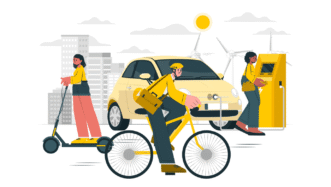LESSON OVERVIEW
The main objectives of this speaking lesson are to:
- do various activities to talk about chores;
- practise chore-related vocabulary;
- watch a funny video on doing chores at work.
In this speaking lesson, students talk about chores, work with vocabulary (e.g. do the dishes, make the bed, mop the floor, etc.) and watch a short funny video where a group of people use a chore wheel. Students discuss the frequency of chores, tips to make them fun and their personal experiences. Students also do role-play tasks in which they assign and prioritise chores in different scenarios.
B1 / Intermediate45 min
60 minSpeaking ClassUnlimited Plan
This is a Speaking Class worksheet. It includes a variety of tasks that let your students practise their speaking skills. This lesson format does not focus on grammar or vocabulary. Learn more about it here.
WARM-UP AND VOCABULARY
This lesson begins with a warm-up in which students look at photos related to chores, say what words they think of when they see them and explain why the photos make them think of these words. After that, they create chores using verbs and nouns from boxes (e.g. vacuum the carpet). Students describe a chore to their partner using no more than three words. Their partner should guess what chore they mean. Following that, students think of chores for different categories (e.g. chores people do in the kitchen, chores people do outside, chores you hate, etc.). Next, they talk about chores and discuss questions about reasons people like or dislike chores, the frequency of chores, and ways to make chores more enjoyable.
VIDEO AND DISCUSSION
At this point in the lesson, students prepare to watch a video in which a group of people use a chore wheel at work. Students say what they think the chore wheel is for and watch the video to check their ideas. Following that, they read sentences about opinions on the chore wheel and chores at the workplace. In the task, students choose one option to complete each of the sentences and give some details (e.g. I have/haven’t tried a similar idea to decide who does what). Next, they talk about chores by looking at some ways of dealing with chores (e.g. chore day – doing all chores on a particular day once a week) and discussing who such ideas are good for. Finally, they do role-play tasks where they assign and prioritise chores in different scenarios.
Subscribe to unlock these and many other Standalone lesson lesson plans with the Unlimited planWORKSHEETS












Great lesson! Exercise on page 5 was very confusing for the students though…
Hi, thanks! If you’re referring to the task in slide 5, it’s a guessing game, kind of like Taboo but simpler. A students picks a chore and says three words to describe it, and their partner needs to guess the chore. There is an example in the slide, and another one would be: student A says ‘plate’, ‘clean’ and ‘machine’ and student B (hopefully) guesses ‘load the dishwasher’. Hope this helps!
Great lesson Ewa, thanks!
Thank you, glad to hear that 🙂